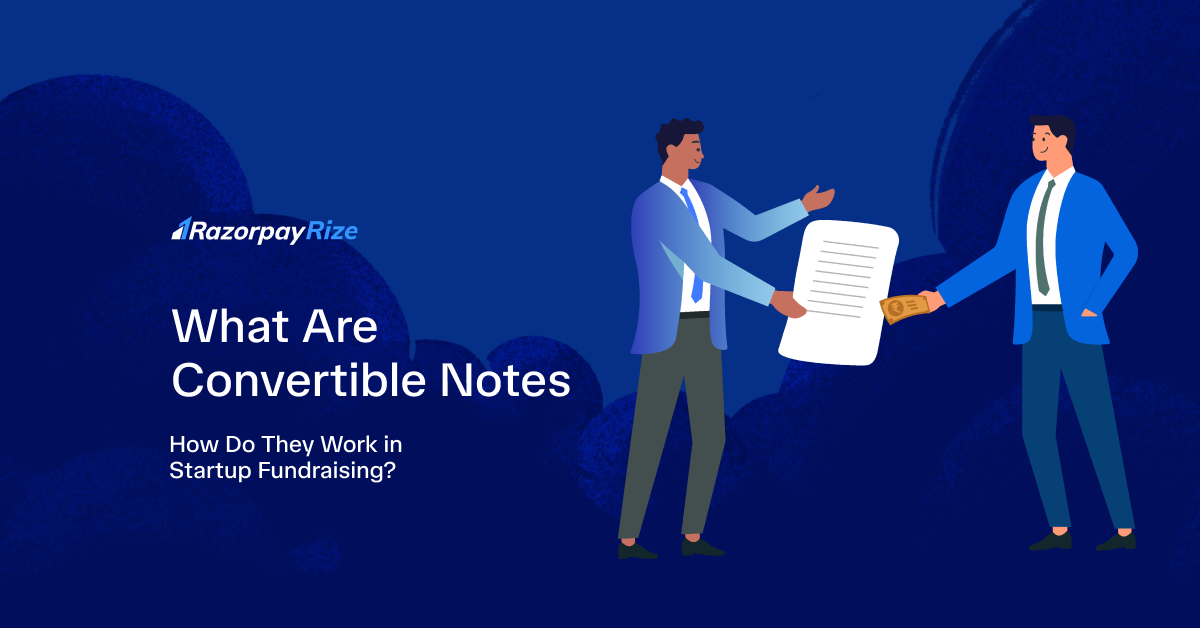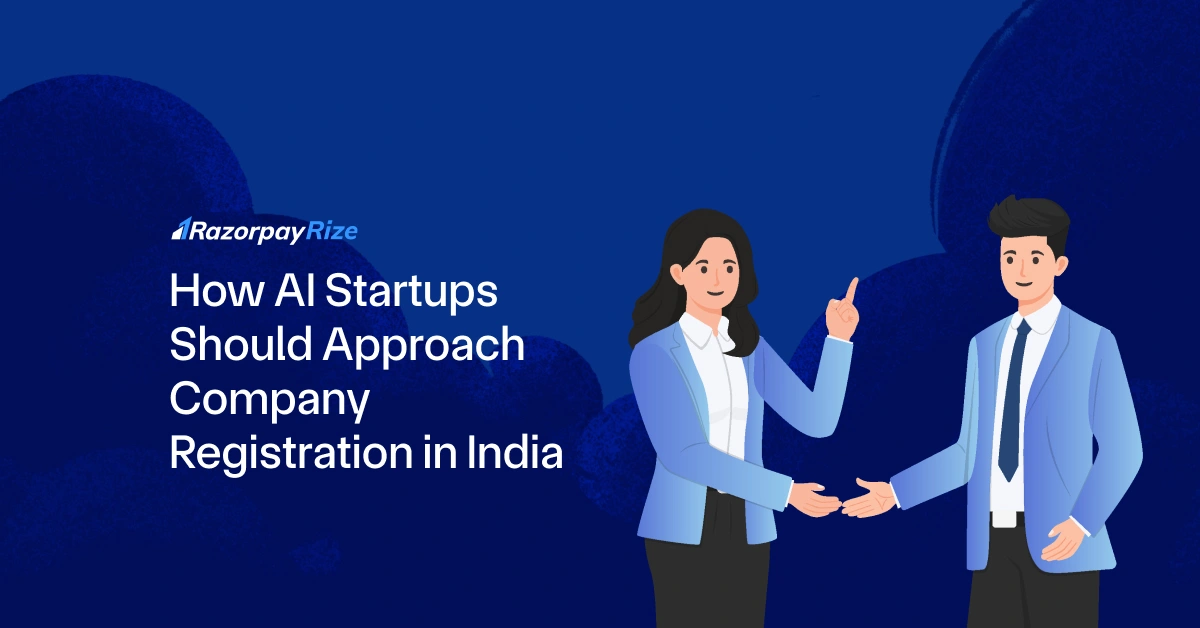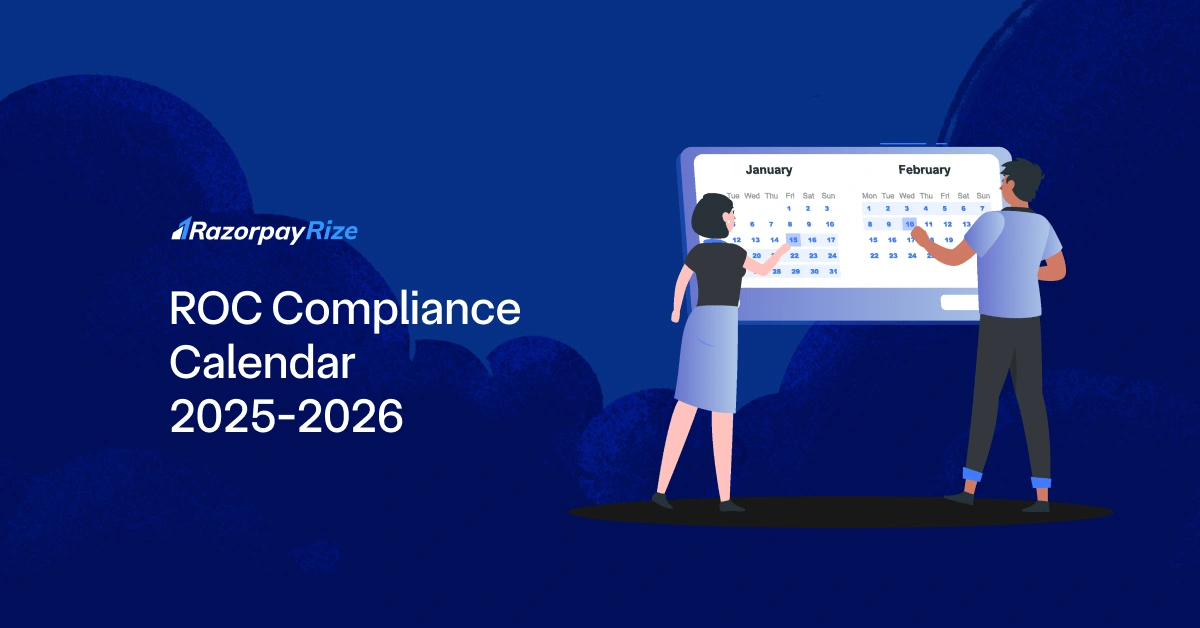Raising funds is one of the biggest hurdles for early-stage startups. At this stage, startups often lack a precise valuation or revenue history, making traditional equity deals complicated. That’s where convertible notes come in.
A convertible note is a short-term debt instrument that allows startups to raise capital without immediately determining their valuation or giving away equity. It balances founder flexibility and investor confidence, acting as a bridge between debt and equity financing.
In this blog, we’ll explain how convertible notes work, why startups prefer them, and what founders should know before using them in their fundraising strategy.
Table of Contents
What is a Convertible Note?
A convertible note is a loan from an investor that can later be converted into equity (shares) when the startup raises its next funding round or reaches a specific milestone.
Instead of repaying the investor in cash like a traditional loan, the startup converts the debt into company ownership. This allows startups to access capital early without locking in a valuation or issuing shares immediately.
Convertible notes are widely used in seed and pre-seed funding rounds, providing flexibility for startups and investors while postponing complex valuation negotiations.
How Convertible Notes Work?
Here’s how the process unfolds:
- Investment Agreement: The startup and investor agree on key terms like the loan amount, interest rate, maturity date, and conversion conditions.
- Issuance of Note: The investor provides funds in exchange for a promissory note, which acts as a legal IOU.
- Conversion Event: When the startup raises its next qualified funding round, the note automatically converts into equity (usually at a discount or based on a valuation cap).
- Alternative Outcome: If no conversion event occurs before maturity, the startup may either repay the loan or renegotiate the terms.
This flexibility makes convertible notes a popular choice for fast-moving startups that need funding without lengthy legal and valuation discussions.
Benefits of Using Convertible Notes
Convertible notes offer several advantages for both startups and investors:
For Startups
- Faster fundraising: Quicker to execute than equity rounds.
- Deferred valuation: Startups can delay pricing their company until more data or traction is available.
- Lower legal cost: Simpler structure means fewer negotiations and legal fees.
For Investors
- Discounted equity: They typically receive shares at a lower price when the note converts.
- Interest earnings: Convertible notes accrue interest until conversion.
- Early access: Investors can get in early on promising startups without complex equity deals.
Key Terms in a Convertible Note Agreement
Before issuing or signing a convertible note, it’s important to understand these essential terms:
- Conversion Discount: The percentage reduction applied to the next round’s share price when the note converts (e.g., 20% discount).
- Valuation Cap: The maximum company valuation at which the note can convert, protecting investors from excessive dilution.
- Interest Rate: The annual interest accrued on the loan until conversion.
- Maturity Date: The date by which the note must convert or be repaid.
- Conversion Price: The price per share at which the debt converts into equity.
- Qualified Financing: The future funding round that triggers the conversion event.
How to Issue a Convertible Note Agreement
Issuing a convertible note involves several key steps:
- Define Terms: Set conversion terms, maturity, interest, and caps.
- Draft Agreement: Work with legal counsel to prepare the convertible note document.
- Investor Due Diligence: Allow investors to review your financials, business model, and growth plan.
- Execute and Collect Funds: Once signed, funds are transferred, and the note becomes active.
- Maintain Records: Keep accurate documentation for compliance and future conversion.
- Conversion or Repayment: At the next qualified financing, the note converts into equity or is repaid if agreed.
While templates are available online, startups should always consult a legal expert to ensure compliance and protection.
Can a Convertible Note Be Paid Back?
Yes! Technically, convertible notes are debt, so they can be repaid if not converted.
However, in startup practice, most notes convert into equity rather than being repaid. Repayment typically happens if no conversion event occurs before maturity or if the startup decides not to pursue further funding.
Why Do Startups Use Convertible Notes?
Startups and investors both benefit from the simplicity and speed of convertible notes.
- They enable fast fundraising without formal valuation.
- Legal fees are lower than equity rounds.
- Founders can retain more control in early stages.
Convertible notes are often the first step in a startup’s journey toward larger equity rounds.
Key Considerations When Using Convertible Notes
While convertible notes are convenient, they come with a few considerations:
- Future Dilution: Conversion discounts and caps can affect founder ownership.
- Cash Flow Risk: Accrued interest increases the repayment burden if conversion doesn’t occur.
- Investor Expectations: Misalignment on conversion terms can complicate future funding.
- Cap Table Complexity: Multiple notes with varying terms can make ownership calculations messy.
Founders should plan ahead, seek legal advice, and ensure clear communication with investors before proceeding.
Frequently Asked Questions (FAQs)
Private Limited Company
(Pvt. Ltd.)
- Service-based businesses
- Businesses looking to issue shares
- Businesses seeking investment through equity-based funding
Limited Liability Partnership
(LLP)
- Professional services
- Firms seeking any capital contribution from Partners
- Firms sharing resources with limited liability
One Person Company
(OPC)
- Freelancers, Small-scale businesses
- Businesses looking for minimal compliance
- Businesses looking for single-ownership
Private Limited Company
(Pvt. Ltd.)
- Service-based businesses
- Businesses looking to issue shares
- Businesses seeking investment through equity-based funding
One Person Company
(OPC)
- Freelancers, Small-scale businesses
- Businesses looking for minimal compliance
- Businesses looking for single-ownership
Private Limited Company
(Pvt. Ltd.)
- Service-based businesses
- Businesses looking to issue shares
- Businesses seeking investment through equity-based funding
Limited Liability Partnership
(LLP)
- Professional services
- Firms seeking any capital contribution from Partners
- Firms sharing resources with limited liability
Frequently Asked Questions
When do convertible notes convert into equity?
Convertible notes typically convert into equity during the next qualified funding round, which is usually when the startup raises a larger investment (like a Seed or Series A round).
At that point, the debt automatically converts into shares at a discounted price or based on a valuation cap agreed upon in the note.
Do convertible notes accrue interest?
Yes. Convertible notes generally carry an interest rate, similar to traditional loans. The interest accrues over time until conversion or repayment.
Can convertible notes be converted before the next funding round?
Sometimes, yes, but it depends on the terms of the agreement. Some convertible notes allow early conversion, especially if both the startup and investor agree or if a triggering event (like acquisition or maturity) occurs before a new funding round. Early conversion is less common but can be negotiated in the note’s structure.
Do convertible notes have voting rights?
No. Until the note converts into equity, investors do not have voting rights in the company.
What happens if the notes don’t convert?
If a conversion event doesn’t occur before the maturity date, a few outcomes are possible:
- The startup repays the principal and interest (though many early startups may lack funds to do so).
- Both parties agree to extend the maturity period.
- The note converts into equity at a pre-defined price even without a new round.








%20Explained%20(1).webp)







